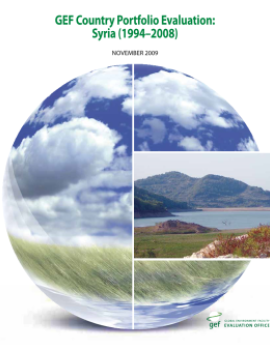Syria has been receiving GEF support since 1994 via regional and national projects, the majority of which are in biodiversity, alongside climate change, persistent organic pollutants (POPs), and 1 multifocal project. This is in addition to the GEF corporate Small Grants programme. There are no projects combating land degradation in the country. Syria was deemed a good choice for evaluation because it is eligible for an individual climate change allocation under the Resource Allocation Framework and also for a group allocation in biodiversity, and also because it has a relatively small GEF portfolio when compared with other countries in the region. Main findings and recommendations of the Syria Country Portfolio Evaluation were presented to the GEF Council as a part of the Annual Country Portfolio Evaluation Report 2009 (ACPER 2009).
Conclusions
- GEF support to biodiversity has been successful in creating formal protection mechanisms and strengthening management systems.
- GEF support has influenced national energy efficiency laws, however, there are no data on greenhouse gas emission reductions.
- Results in other GEF focal areas are limited and involve establishing the foundations for national action plans and developing national capacity.
- Sustainability over the long-term is a challenge.
- National priorities such as inland international waters and land degradation have not been addressed.
- SGP project outcomes are more likely to be sustained by local communities than outcomes from full or medium-sized projects.
- Country ownership of GEF portfolio is stronger for national projects than regional and global ones.
- National stakeholders perceive the GEF as too complicated and inefficient which is damaging to project proposals and implementation.
- Syria has limited access to GEF investment agencies.
- The GEF focal point is overly internalized within the Ministry of State for Environmental Affairs and there is no clear mechanism for developing and improving GEF projects.
Recommendations
- The GEF should increase funding for land degradation and water management issues.
- The GEF should focus on countries with limited access to international finance institutions, like Syria.
- The GEF should proactively create financial instruments and establishing appropriate frameworks to support sustainability of GEF projects.
- A permanent GEF national coordination committee should be established in Syria.
